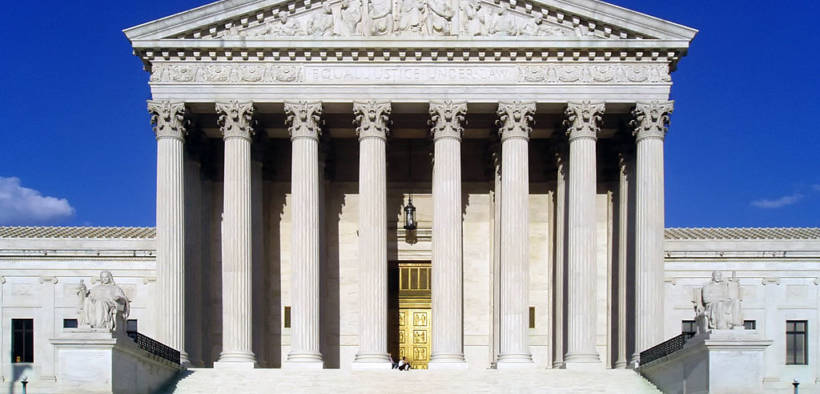Supreme Court Rules LGBT Employees Protected by Civil Rights Act in Defeat for Trump Administration

“Today, by affirming that sexual orientation and gender identity discrimination are prohibited under Title VII of the Civil Rights Act, the Supreme Court has confirmed the simple but profoundly American idea that every human being should be treated with respect and dignity.”
In a 6-3 ruling that divided President Donald Trump’s two Supreme Court appointees, the court ruled Monday that federal law protects LGBT workers. The Trump administration argued that the 1964 Civil Rights Act does not apply in instances concerning gender identity and sexual orientation.
Not a Question of Intent
Justice Neil Gorsuch and Chief Justice John Robert, each appointed by Republican presidents, authored the majority opinion explaining the court’s decision to affirm LGBT workplace protections at the national level, POLITICO reported.
“Those who adopted the Civil Rights Act might not have anticipated their work would lead to this particular result. Likely, they weren’t thinking about many of the Act’s consequences that have become apparent over the years, including its prohibition against discrimination on the basis of motherhood or its ban on the sexual harassment of male employees,” Gorsuch wrote.
However, even if the authors of the Civil Rights Act had not conceived it would one day protect LGBT workers, that is no excuse for not including them under the umbrella of the law, Gorsuch reasoned.
Furthermore, Gorsuch defended the use of the Title VII provision of the law as a center of LGBT protections.
“An employer who fires an individual for being homosexual or transgender fires that person for traits or actions it would not have questioned in members of a different sex. Sex plays a necessary and undisguisable role in the decision, exactly what Title VII forbids,” he wrote.
‘A Mistake’
The idea of two conservatives siding with liberal justices did not sit well with Justice Samuel Alito.
“There is only one word for what the Court has done today: legislation,” Alito wrote in his dissent alongside Justice Clarence Thomas. “The document that the Court releases is in the form of a judicial opinion interpreting a statute, but that is deceptive…A more brazen abuse of our authority to interpret statutes is hard to recall. The Court tries to convince readers that it is merely enforcing the terms of the statute, but that is preposterous.”
Alito argued that the intention of the authors of the law is critical when ruling on it. The court has a duty, he said, to examine “the social context in which a statute was enacted” in order to glean the true meaning a law.
Trump’s other appointee, Justice Brett Kavanaugh, called the court’s ruling “a mistake of history and sociology” because the 1964 law was not intended to include LGBT rights. Like Alito, Kavanaugh also said if the intention was to change Title VII, it should be done through legislation, not the court, CNN reported.
Defining ‘Sex’
Title VII reads: “It shall be an unlawful employment practice for an employer – (1) to fail or refuse to hire or to discharge any individual, or otherwise to discriminate against any individual with respect to his compensation, terms, conditions, or privileges of employment, because of such individual’s race, color, religion, sex, or national origin.”
Although not specifically mentioned, the majority ruling from the Supreme Court groups sexual orientation and gender identity with the term ‘sex’.
The immediate reaction from the Trump administration came from White House adviser Kellyanne Conway who argued the justices erred in warping the meaning behind the law.
“We’ve had the Civil Rights Act for 56 years. Everybody has understood what it meant,” Conway said on Fox News. “It’s very important though to stick to a statute or a law as it is written….If people want to change the law they should go to the congress. Our Congress doesn’t seem to like to work as hard as the other two branches.”
Conway’s reaction is the only statement from the Trump administration thus far, but the court’s ruling notably came as the White House is rolling back LGBT protections in the Affordable Care Act. The Trump administration finalized the new language of the law on Friday and at least one LGBT group, Lambda Legal, announced plans to sue over it, NPR reported.
Like Monday’s ruling, the new language for the Affordable Care Act would focus on how the word ‘sex’ is defined.
Celebratory Moment
The Supreme Court’s ruling for inclusion of LBGT workers in the Civil Rights Act was actually on two separate cases, CNN reported. The first centered on sexual orientation and another related to transgender rights. Aimee Stephens, the transgender woman who brought the second case, passed away last month. Before she died, she contended that she was fired from a funeral home over her gender identity.
Stephens’ case was noteworthy as it was the first time the highest court heard oral arguments on transgender civil rights, CNN reported.
Her wife cheered the victory as honoring Stephens as “a leader.”
“I am grateful for this victory to honor the legacy of Aimee, and to ensure people are treated fairly regardless of their sexual orientation or gender identity,” Donna Stephens said.
Alphonso David, president of the Human Rights Campaign, called it a “landmark victory” and Democratic presidential candidate Joe Biden issued a statement commending the decision.
“Today, by affirming that sexual orientation and gender identity discrimination are prohibited under Title VII of the Civil Rights Act, the Supreme Court has confirmed the simple but profoundly American idea that every human being should be treated with respect and dignity,” Biden said. “That everyone should be able to live openly, proudly, as their true selves without fear.”















